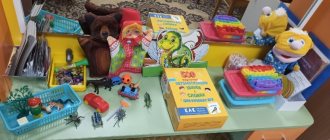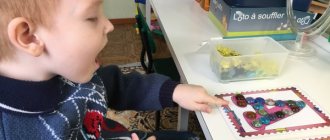Absolutely all parents want their child to be the best, successful, smart, do well at school and have many friends.
Timely speech development plays an important role in achieving these goals. Children with speech problems become withdrawn, communicate little with peers, and, as a result, begin to lag behind in intellectual development. Isn't it better to deal with violations in a timely manner and help the child adapt to society?
When is it time to see a speech therapist?
The opinion that a speech therapist works only with older preschoolers is already outdated. The most suitable age for identifying speech problems and working to correct them is considered to be 2-3 years. Even in such children, a specialist can easily determine the presence of speech development disorders.
Everyone knows that a problem is easier to prevent than to fix. If speech disorders are not corrected at an early age, they only get worse, creating conditions for a lag in the formation of higher mental activity.
If you notice that:
- The baby does not develop humming or babbling at six months;
- a one-year-old baby does not begin to pronounce his first words;
- a two- or three-year-old cannot construct simple sentences;
- the child has a small vocabulary;
- sounds are difficult to pronounce;
- there are problems with attention, memory,
make an appointment with a speech therapist!
How can a speech therapist help a child?
The specialist will assess the child’s speech therapy level, identify existing problems in speech and non-speech development, and outline a plan for correctional work.
The speech therapist will help the child:
- Learn to correctly pronounce the sounds of your native language. This means the child will be able to communicate well with friends, both adults and peers will understand him, he will not experience awkwardness and inconvenience due to distorted sound pronunciation.
- Distinguishing sounds by ear, which promotes correct writing, will eliminate errors when reading and writing text, and will prevent the occurrence of dyslexia and dysgraphia.
- Learn to speak beautifully, build coherent speech, without which it is impossible to communicate or study school subjects that require retelling and oral answers.
- Improve fine motor skills, coordinate finger movements, and therefore subsequently learn to write and draw beautifully. In addition, such work stimulates the general formation of speech skills.
- To develop memory, imagination, imaginative thinking, without which it is impossible to study the exact sciences.
Organization of speech therapy assistance for children
Svetlana Tyurina
Organization of speech therapy assistance for children
Speech is one of the central, most important mental functions, a “mirror”
the course of mental operations, emotional states, a means of self-realization and entry into society. It has a huge impact on the formation of the child’s mental processes and on his overall development. The development of thinking largely depends on the development of speech; speech is the basis for mastering literacy and all other disciplines; it is the main means of communication between people; speech plays a big role in regulating the behavior and activities of a child at all stages of his development.
The richer and more correct a child’s speech, the easier it is for him to express his thoughts, the wider his opportunities, the more meaningful and fulfilling his relationships with peers and adults, the more active his mental development is. However, not all children equally successfully master the phonetic, lexical and grammatical aspects of speech, which often leads to a violation of the child’s self-awareness and self-esteem. In turn, deviations in the development of the personality of a child with speech disorders: isolation, self-doubt, negativism - to a certain extent aggravate speech defect, preventing them from learning and fully developing their natural abilities and intellectual capabilities. Therefore, it is necessary to take care of the timely formation of children’s speech, its correctness and purity, preventing and correcting any deviations from the generally accepted norms of their native language.
Speech disorders are varied. They vary in severity and depend on the cause and structure of the defect.
In accordance with the principle of psychological and pedagogical classification proposed by R. E. Levina, speech disorders, manifested in the immaturity of linguistic means, can be divided into three large groups.
The first group is phonetic speech disorders. They are expressed both in defects in the pronunciation of individual sounds and their groups without other accompanying manifestations.
The second group is phonemic disorders. They are expressed in the fact that the child not only pronounces certain sounds defectively, but also does not differentiate them sufficiently, and does not perceive the acoustic and articulatory difference between oppositional sounds. This leads to the fact that children do not clearly master the sound composition of a word and make specific errors when reading and writing.
The third group is general speech underdevelopment. It is expressed in the fact that the violation extends to both the sound and semantic aspects of speech.
The required amount of assistance for a child depends on the nature and degree of manifestation of speech disorders in him. Some speech disorders disappear with age, some of them can be eliminated with a little help from a speech therapist working with parents or at a speech center , in a children's clinic or in a regular preschool institution. Children with the most severe speech impairments need long-term, systematic help from a speech therapist in speech groups in kindergartens and special schools. Enrollment of children in special speech groups and classes is made based on the decision of the psychological, medical and pedagogical commission .
Correctional work with children in these institutions is aimed at overcoming their speech and psychophysical disorders by conducting individual, subgroup and group (frontal)
speech therapy sessions . The main form of organization of speech therapy work is group classes.
Children with a homogeneous structure of speech defects are selected into groups. Of the identified children with speech impairments, the following groups can be completed (the number of children in urban and rural educational institutions is indicated in parentheses): • with general speech underdevelopment and reading and writing disorders caused by it (4-5; 3-4, frequency of speech therapy sessions at least 3 times a week;
• with phonetic-phonemic or phonemic underdevelopment of speech and reading and writing disorders caused by it (5-6; 4-5, frequency of speech therapy classes 2-3 times a week;
• phonetic disorders (6-7, 4-5, frequency of speech therapy sessions 1-2 times a week.
Individual speech therapy classes are conducted with children with severe speech impairments: OPD level II; disorders of the structure and mobility of the articulatory apparatus (rhinolalia, dysarthria)
.
The frequency of speech therapy sessions is at least 3 times a week.
The maximum capacity of speech groups for preschool children with special needs from 3 to 7 years old is up to 10 people, for children with functional disabilities - up to 12 people. The maximum capacity of special speech classes is no more than 12 people. At the same time, no more than 25 people are engaged in speech therapy centers in urban areas, and no more than 20 in rural areas.
The group with general speech underdevelopment includes children with different levels of speech development. Children with level I speech underdevelopment should be enrolled in a preschool institution from the age of 3 for 3-4 years of study; with level II speech underdevelopment - from 3-4 years to 3 years of study; with level III speech underdevelopment - from 4-5 years to 2 years of study; with phonetic-phonemic underdevelopment of speech - from 4-5 years old for one year of study; those with rhinolalia and dysarthria are enrolled for 2 years of study, those with alalia and aphasia - for 3 years.
To enroll a child in a speech therapy group, it is necessary that at least two groups of sounds are impaired, for example, whistling and sonorant, sonorant and hissing, which in total amounts to at least 5-6 sounds.
Children with impaired pronunciation of certain sounds are enrolled in a preschool institution from the age of 4-5. Their training period is six months.
The duration of correctional and developmental education for children with reading and writing disorders caused by phonetic-phonemic or phonemic underdevelopment at the speech center of a general education school is approximately 4-9 months. (from one half-year to the whole academic year )
. The period of correctional and developmental education for children with reading and writing disorders caused by general speech underdevelopment is approximately 1.5-2 years.
(correctional) students
schools for children with severe speech impairments is reviewed at the end of each school year.
The pedagogical council of the school, on the basis of the conclusion of the medical-pedagogical commission, decides on the issue of transferring some students to a mainstream school (as the speech defect is eliminated or weakened)
or a special school of another type, if the speech underdevelopment of these students was secondary in nature and was caused by a decrease in hearing or intelligence.
A common problem in the correctional and developmental education of children of preschool and primary school age is their timely and targeted preparation for learning to read and write. In this regard, one of the main tasks of correctional and developmental education is the normalization of the sound side of speech. This means that both for a group of children with phonetic-phonemic, phonemic underdevelopment, and for a group of children with general speech underdevelopment, it is necessary:
• form full-fledged phonemic processes;
• form ideas about the sound-letter composition of a word;
• develop skills in analysis and synthesis of the sound-syllable composition of a word ;
• correct pronunciation defects.
This, as a rule, is the end of the work with children who have phonetic-phonemic underdevelopment. Speech therapy work with children who have general speech underdevelopment involves the normalization of lexical and grammatical means of the language and the formation of coherent speech.
The content of classes to fill gaps in the development of vocabulary and grammatical structure of speech is aimed at active work on:
• clarifying the meanings of children’s words and further enriching their vocabulary both by accumulating new words that are different parts of speech, and by developing the ability to actively use various methods of word formation;
• clarifying the meanings of the syntactic structures used;
• further development and improvement of the grammatical design of coherent speech through students’ mastery of word combinations, the connection of words in a sentence, and models of various syntactic structures.
Development and improvement of skills in constructing a coherent statement involves:
• programming the semantic structure of the statement,
• establishing coherence and consistency of utterances,
• selection of linguistic means necessary to construct an utterance for certain purposes of communication.
These goals are implemented in a certain sequence:
1. Formation of practical ideas about the text.
2. Development of skills and abilities to analyze text.
3. Development of skills and abilities to construct an independent coherent statement.
Practice shows that a child with speech impairments can be brought out of this state with systematic work with him. Whenever a child begins education, speech therapy work should be structured taking into account his age and individual abilities in accordance with the type of disorder.
Literature:
1. Povalyaeva M. A. Speech therapist's . –Rostov-on-Don: “Phoenix”
,
2002. – 448 p.
2. Yastrebova A. V., Bessonova T. P. Instructional and methodological letter about the work of a speech therapist teacher at a secondary school. (Main directions of formation of prerequisites for productive mastery of the native language teaching program for children with speech pathology). – M.: “Cogito-Center”, 1996 – 47 p.
Why do parents need to consult a speech therapist?
As a rule, speech therapists ask the child’s parents to come for a consultation. This is necessary, firstly, in order to obtain the necessary information about the course of pregnancy and childbirth, about how the child developed in the early period of life.
Based on this information, the speech therapist draws conclusions about the possible causes of violations and, therefore, plans correctional tactics. Secondly, it is important that family members correctly understand what is happening with the child, know how to study at home and help develop speech.
What the speech therapist will tell parents:
- Explains the child’s level of speech development and whether it meets age standards.
- If there are speech impairments, he will tell you about plans for correction and give recommendations for classes in the center and at home.
- Will offer options for visiting specialists to conduct lessons.
- It will help you understand how to help your child develop speech at home, how to complete tasks given by a speech therapist, how to express support and create a favorable climate in the family.
- He will give recommendations for the further development of the child’s speech and indicate what points to pay special attention to.
Among other things, the speech therapist will answer parents’ questions about ongoing classes, the dynamics of correctional work, and the timing of correction.
How to speed up the correction process
To successfully correct speech defects, you will need not only the help of experienced speech therapists, but also, possibly, a visit to a child psychologist. But even with all the involvement of highly professional specialists, the role of parents is very important. Compliance with certain rules by parents will help the child quickly overcome the difficulties that arise:
- doing homework regularly;
- regular attendance at speech therapy lessons;
- responsible implementation of the speech therapist’s instructions;
- compliance with doctor's recommendations, including drug treatment;
- controlling the child's speech.
It should be remembered that children learn information that they find interesting and perform tasks that they enjoy doing. Therefore, do not turn speech therapy classes into a boring learning process, introduce an element of play and participate in them with sincere interest.
Sofia Rogozinskaya
How are classes going?
The main rule in corrective speech therapy work is the comfortable psychological state of the child.
All classes with preschoolers are conducted in the form of a game and do not take more than 45 minutes. To prevent children from getting tired, activities change frequently during the lesson. This allows the speech therapist to carry out comprehensive work in one lesson, conducting all the necessary exercises - from articulatory gymnastics to didactic games. It is quite difficult to determine in advance how long the correction will take. All children are individual, so only after consultation and the start of classes can a specialist predict the approximate timing.
It is extremely important that the child continues to study at home and maintains the skills he has developed. That is why the participation of parents in the work process is simply necessary. The more consistent and active the work is, the faster the child will cope with the problem.





